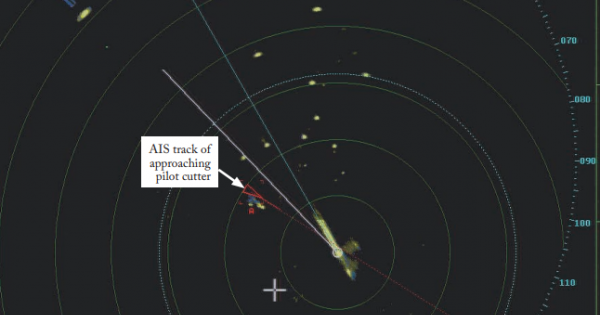A tanker and an anchored fishing vessel came into brief contact, after the pilot of the tanker realised the two vessels were too close to avoid contact and the crew of the fishing vessel had not realise the tanker was close, according to a recent report by UK MAIB.
A laden chemical tanker was proceeding at slow speed in a designated ‘pilot boarding area’ to embark a pilot in preparation for arrival into port. It was a calm, clear day and there were numerous small recreational fishing vessels anchored in the same vicinity, which was popular for sea-angling. The tanker’s master was aware of the anchored fishing vessels ahead but did not want to change course until the pilot boat transfer was complete.
Meanwhile, the two occupants on board one of the anchored fishing vessels had been concentrating on fishing and were unaware of the tanker approaching until it was extremely close. When the fishermen saw the tanker’s bow, they realised that there was a risk of collision. The fishermen considered cutting their anchor line but did not want to leave the boat’s cockpit to do so, and they did not have time to lower the outboard engine down into the sea.
When the pilot arrived on the tanker’s bridge, he realised that the fishing boat was only about 20m ahead, so he ordered full starboard rudder in an attempt to swing away from the anchored boat.
However, the tanker and the fishing boat briefly came into contact. The fishing boat’s anchor line broke after snagging on the tanker and the fishermen fended of by hand until the tanker had passed.
Following investigation, the UK MAIB highlighted the following lessons learned:
1. All vessels at all times have a responsibility to take action to avoid collision. There was plenty of sea room either side of the anchored fishing vessels, so the tanker’s master could have taken early avoiding action. Even if this resulted in a short delay to the pilot transfer, it would have been a safer option than continuing to head slowly towards the fishing boats.
2. Although it is the general practice of good seamanship that a vessel underway will keep clear of an anchored vessel, the crew of the fishing boat should have acted earlier to avoid the collision. They were very familiar with the area and knew they were anchored in a pilot boarding area. Despite this local knowledge, the fishermen were not keeping a lookout and did not see the tanker approaching until it was too late. Had they spotted the tanker earlier, there would have been plenty of time to lift the anchor, start the engine and get out of the way.
3. Sound signals should be used when the actions of another vessel are uncertain. It was good, daylight conditions and neither vessel thought to use sound signals to warn the other.
4. VHF radio can provide important additional information to improve awareness, especially for vessels operating in the approaches to a commercial harbour. The fishing boat was equipped with a hand-held VHF radio; however, this was switched off.






























































